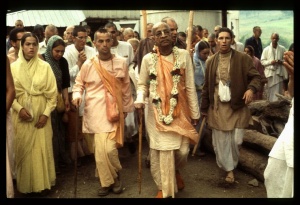CC Adi 4.107 (1975): Difference between revisions
(Vanibot #0027: CCMirror - Mirror CC's 1996 edition to form a basis for 1975) |
(Vanibot #0020: VersionCompareLinker - added a link to the Version Compare feature) |
||
| Line 2: | Line 2: | ||
<div style="float:left">'''[[Sri Caitanya-caritamrta (1975)|Śrī Caitanya-caritāmṛta (1975)]] - [[CC Adi (1975)|Ādi-līlā]] - [[CC Adi 4 (1975)|Chapter 4: The Confidential Reasons for the Appearance of Śrī Caitanya Mahāprabhu]]'''</div> | <div style="float:left">'''[[Sri Caitanya-caritamrta (1975)|Śrī Caitanya-caritāmṛta (1975)]] - [[CC Adi (1975)|Ādi-līlā]] - [[CC Adi 4 (1975)|Chapter 4: The Confidential Reasons for the Appearance of Śrī Caitanya Mahāprabhu]]'''</div> | ||
<div style="float:right">[[File:Go-previous.png|link=CC Adi 4.106 (1975)|Ādi-līlā 4.106]] '''[[CC Adi 4.106 (1975)|Ādi-līlā 4.106]] - [[CC Adi 4.108 (1975)|Ādi-līlā 4.108]]''' [[File:Go-next.png|link=CC Adi 4.108 (1975)|Ādi-līlā 4.108]]</div> | <div style="float:right">[[File:Go-previous.png|link=CC Adi 4.106 (1975)|Ādi-līlā 4.106]] '''[[CC Adi 4.106 (1975)|Ādi-līlā 4.106]] - [[CC Adi 4.108 (1975)|Ādi-līlā 4.108]]''' [[File:Go-next.png|link=CC Adi 4.108 (1975)|Ādi-līlā 4.108]]</div> | ||
{{CompareVersions|CC|Adi 4.107|CC 1975|CC 1996}} | |||
{{RandomImage}} | {{RandomImage}} | ||
==== TEXT 107 ==== | ==== TEXT 107 ==== | ||
Latest revision as of 17:30, 26 January 2020

A.C. Bhaktivedanta Swami Prabhupada
TEXT 107
- śeṣa-līlāya prabhura kṛṣṇa-viraha-unmāda
- bhrama-maya ceṣṭā, āra pralāpa-maya vāda
SYNONYMS
śeṣa-līlāya—in the final pastimes; prabhura—of Lord Caitanya Mahāprabhu; kṛṣṇa-viraha—from separation from Lord Kṛṣṇa; unmāda—the madness; bhrama-maya—erroneous; ceṣṭā—efforts; āra—and; pralāpa-maya—delirious; vāda—talk.
TRANSLATION
In the final portion of His pastimes, Lord Caitanya was obsessed with the madness of separation from Lord Kṛṣṇa. He acted in erroneous ways and talked deliriously.
PURPORT
Lord Śrī Caitanya exhibited the highest stage of the feelings of a devotee in separation from the Lord. This exhibition was sublime because He was completely perfect in the feelings of separation. Materialists, however, cannot understand this. Sometimes materialistic scholars think He was diseased or crazy. Their problem is that they always engage in material sense gratification and can never understand the feelings of the devotees and the Lord. Materialists are most abominable in their ideas. They think that they can enjoy directly perceivable gross objects by their senses and that they can similarly deal with the transcendental features of Lord Caitanya. But the Lord is understood only in pursuance of the principles laid down by the Gosvāmīs, headed by Svarūpa Dāmodara. Doctrines like those of the nadīyā-nāgarīs, a class of so-called devotees, are never presented by authorized persons like Svarūpa Dāmodara or the six Gosvāmīs. The ideas of the gaurāṅga-nāgarīs are simply a mental concoction, and they are completely on the mental platform.